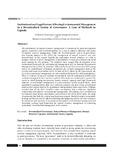| dc.description.abstract | Decentralization of natural resource management is considered by many development agents, researchers and environmentalists, as a way to improve efficiency and equity in natural resource management. Under the decentralization system of governance that Uganda adopted in the 1990s, the management of natural resources was also decentralized. In this regard, Uganda has undertaken several initiatives in a bid to delegate natural resource management responsibilities to local governments and build local capacity for this purpose. The initiatives have ranged from development of an institutional framework for environmental management such as National Environment Management Act (1995), the Land Act 1998, and the Local Government Act 1997 among others, to establishment of funding mechanisms for wetland management both at the Central and Local Government levels. In spite of these efforts by the Government, the level of environmental management in a decentralized framework is still unsatisfactory. There is evidence of massive wetland encroachment, and the anticipated benefits from wetlands management have not been realized. This study was conducted to examine the extent to which funding mechanisms, human resource capacity and legal framework influence environmental management in a decentralized system of governance. Both quantitative and qualitative data were collected; analysis was done using correlational analysis and content analysis for quantitative and qualitative data respectively. Findings revealed that all the three variables under investigation had a moderate significant relationship with effective environmental management. The findings were corroborated by responses from various stakeholders interviewed in the course of the study. The study recommends that both the central and local governments should develop a sustainable funding mechanism and an efficient planning and budgeting system; develop strategies for attraction and retention of key professional staff in environmental management and streamline existing legal framework for natural resource management in enhancing sustainable environmental management in the country. | en_US |

